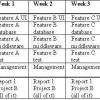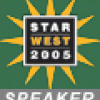|
|
Strengthening Your Speaking Savvy Speaking at a conference can work wonders for your credibility. Delivering a presentation is an opportunity to share your insights, convey valuable information, and gain a reputation as an expert on your topic. Provided you keep a few key points in mind. In this article, Naomi Karten offers suggestions for successful presentations.
|
|
|
|
Do We Have to Choose Between Management and Leadership? Do organizations need fewer managers and more leaders? Do the qualities of one outweigh those of the other? In this article, Esther Derby defines leadership and management, and shows how one test manager incorporates both.
|
|
|
|
How Much Building Is Too Much? Staged integration versus continuous integration—which does your team prefer? Can't decide if one is better than the other? In this column, Johanna Rothman explains that you can create the perfect blend of the two. Developers and testers benefit from frequent builds, but be careful with how much you build. Build too much or too little and a project could topple.
|
|
 |
How Much Work Can You Do—Developing and Managing Your Project Portfolio Knowing how much work your group can accomplish—and how much it takes to complete that work—is critical to your success as a manager. Johanna Rothman explains how to ascertain your team's potential and how to use that information to define and manage your project portfolio so it doesn't manage you.
|
|
 |
Executor or Engineer Software testers are typically grouped en masse in the world of information technology (IT). Many in the software testing profession, however, know that this should not be the case. In this column, Dion Johnson exposes the dichotomy in testing that has produced two distinct groups—software test engineers and software test executors—and why these groups are embroiled in a struggle to possess the crown as the industry's true software quality professionals.
|
|
 |
Unearthing Buried Feedback Most managers realize that giving feedback is an important part of their job. But not all managers are skilled at providing feedback. Some make vague comparisons, mistakenly apply labels as feedback, and others just hint and hope you'll get the message. Esther Derby offers advice on how to probe for the information that will help you understand your manager's concerns when he doesn't state them clearly.
|
|
 |
Is the Grass Greener on the Other Side of the Fence? We may be creatures of habit—adhering to and promoting processes we know well—but we also habitually look to other work environments that appear capable of nurturing our ideas once an old environment becomes depleted. Ed Weller believes that searching for greener pastures is unnecessary. You just need to learn how to cultivate your managers in order to create an environment that will harbor your ideas. Ed explains why you'll end up grazing fruitlessly if you can't plant your ideas with management.
|
|
|
|
Information Gathering If your customer interview questions focus too narrowly on a problem that must be solved, you run the risk of missing information that could be critical to a successful outcome. In this column, Naomi Karten says playing detective improves your ability to gather information. To improve the odds of success, it's important to ask questions from multiple perspectives—and to pay attention not only to the customers' response, but to how they say it as well.
|
|
 |
Openness, Trust, and Healthy Paranoia Trust must be earned in any relationship; it is not automatic nor can it be assumed. You only learn how much you can trust someone over a period of time. The same principle rings true in project management. In this week's column, Peter Clark shares a valuable lesson for project managers and other management professionals, demonstrating that a healthy level of paranoia must precede openness. If openness is premature, one's trust could prove to be unfounded in the end.
|
|
 |
What's on Your Not-to-Do List? Drawing up a to-do list sounds like a logical starting point when you want to prioritize your workload. But if you have an extra-long list of tasks, the list you should start with is the not-to-do list. Doing so forces you to take an extra hard look at what you're doing and if you should be doing it. Learn more about Johanna Rothman's not-to-do list, how it helps you stay focused on the most important tasks, and how it inevitably helps you maintain your value to the organization.
|
|

